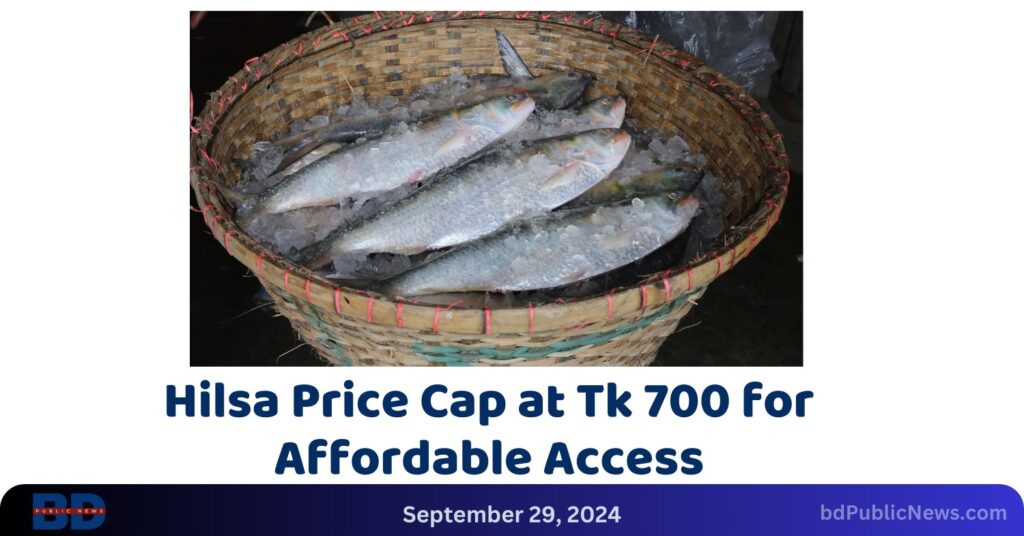Supreme Court Lawyer Demands Hilsa Price Cap at Tk 700 for Affordable Access
Lawyer Issues Legal Notice Demanding Hilsa Price Cap at Tk 700
In a significant move to control the soaring price of hilsa, Bangladesh’s national fish, a Supreme Court lawyer has issued a legal notice requesting the government to set the maximum retail price at Tk 700 per kilogram.
On Sunday (September 29), lawyer Khandaker Hasan Shahriar sent this notice to several key government bodies, including the Secretary of the Ministry of Commerce, the Secretary of the Ministry of Fisheries and Livestock, the Director General of the National Consumer Rights Protection Department, the Chairman of the Bangladesh Competition Commission, the Chairman of the National Board of Revenue, and the Chief Controller of Imports and Exports. The notice was delivered via post and email.
Key Demands and Proposals in the Notice
The notice urges the government to monitor the wholesale and retail markets of hilsa within the next seven days. It also calls for effective measures to prevent illegal cross-border smuggling of hilsa. Moreover, considering climate change and the increasing sea temperatures, the lawyer proposes that Bangladesh should formally negotiate with India to implement a joint ban on hilsa fishing during certain periods.
The notice also emphasizes that hilsa exports should not be priced lower than the domestic market value. If the authorities fail to take action, the lawyer warns of filing a writ petition in the High Court to address the issue.

Hilsa Production and Market Dynamics
Hilsa, primarily found in the Bay of Bengal, is renowned for its unique taste and aroma, particularly the variety from the Padma River. The fish migrates to rivers to spawn, where it gains a distinct flavor from the natural food in the river. Since hilsa is not farmed and is naturally produced, its production costs are virtually non-existent.
Hilsa Conservation and Export Policy
Bangladesh imposes three annual bans on hilsa fishing to protect the species. One of these is a 22-day ban in October, which allows spawning. Another ban is from March 1 to April 30 to protect juvenile hilsa, followed by a ban from May 20 to July 23 to facilitate their growth. In contrast, India’s ban on hilsa fishing lasts from April 15 to June 14. During Bangladesh’s ban periods, large-scale hilsa fishing occurs in India, particularly along the West Bengal coast. The notice stresses the need for synchronized bans between Bangladesh and India for effective conservation.
Market Monopoly and Public Suffering
The notice points out that a group of traders have been monopolizing the hilsa market for an extended period. Following media reports on the steep rise in hilsa prices, the National Consumer Rights Protection Department conducted operations in Dhaka’s Karwan Bazar on September 25 and in Faridpur on September 26. During these operations, hilsa prices suddenly dropped.
The lawyer further notes that hilsa export to India began on September 26 through the Benapole land port at a price of 10 USD (approximately Tk 1,180) per kilogram. However, domestic prices have soared to Tk 1,900-2,400 per kilogram, forcing local consumers to pay excessively high prices. According to the lawyer, this contradicts the government’s export policy 2021-24, which states that hilsa is not a freely exportable commodity. Despite specific conditions for export, negligence by responsible officials has resulted in Bangladesh missing out on significant foreign exchange revenue.
Criticism of Policy Makers’ Negligence
The notice criticizes the authorities for not enforcing the export policy regulations properly. Consequently, the people of Bangladesh are being deprived of enjoying the unique taste of Padma hilsa. Due to the failure of policymakers, consumers are compelled to bear the burden of high prices. The lawyer has warned of filing a writ petition in the High Court if effective measures are not taken promptly to address the situation.
This notice provides a clear guideline on the need for price regulation and market monitoring of hilsa, enforcement of export policies, and synchronization of hilsa fishing bans between Bangladesh and India. The government’s active role in implementing fair and effective policies is crucial to keep hilsa prices within the purchasing capacity of the general public in Bangladesh.






